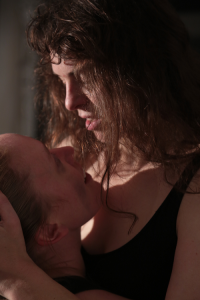 This review was originally written for The Public Reviews: http://www.thepublicreviews.com
This review was originally written for The Public Reviews: http://www.thepublicreviews.com
A disused factory in the shadows of City of London tower blocks is an ironic setting for this descent into Hell. All machinery is gone and we are greeted by just chairs spread around the edges of the floor space and, behind them, bare white-tiled walls. Craft Theatre’s mission is to build a bridge between the 14th and 21st Centuries by delving into Dante Alighieri’s epic poem Divine Comedy and relating it to modern life. The opening of this production had to be put back by a week due to the sad loss of Kan Bonfils during rehearsals. He had been a member of the devising/performing team, along with Helen Foster, Maria Swisher, Tomas Thoroe and Lucas John Mahoney. Ryan Prescott has now stepped in to represent his work. Before the show starts, the five performers, all dressed in work-out kit, are seen limbering up and then huddling in a circle as if preparing for a competitive team sport, thereby suggesting that what follows will be predominantly a work of physical theatre. In fact, although physical movement is a key element of the performance, the essence of the work lies in a modern prose interpretation of the original poem with Russell Brand, John Cage and director Rocky Rodriguez Jr adding text. Dante is now seen as a 30-ish professional man, juggling what starts out as a happy marriage with a demanding job as a lobbyist, advocating causes which seem to be detrimental to the environment. He gets sucked into the rat race, is pressured by a bullying supervisor and then persuaded to have an affair with the boss’s daughter as a means for career advancement. On the edge of a breakdown, he lands up in jail for assaulting a street beggar and then passes into the Underworld from where he is able to take an objective view of his life and realise that the road to Paradise begins in Hell. Stripped back to the essentials, this is an edgy production which is always fascinating to watch due to its raw energy and improvised feel. The stillness of bedroom scenes is contrasted with the tension of office life and the chaos of a busy city street, both represented by jerky, repetitive movements and constant, mostly indecipherable chatter. Hell becomes a mass of writhing bodies, clinging to each other in desperation. Alighieri could not have envisaged the complexities that the passing of seven centuries have added to human existence, but his philosophising about individuals accepting personal responsibility for their lives and determining their own destinies still resonates. The remedies prescribed to cure the ills of the modern Dante are anti-capitalist and pro- green. Although this end point is disappointingly simplistic and obvious, the 80-minute journey to reach it proves to be a stimulating and very different ride.
Performance date: 15 January 2015
